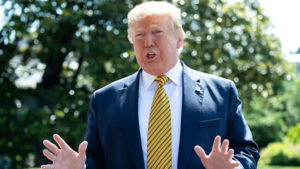 President Donald Trump’s accountant must turn over his tax records to Manhattan prosecutors, a federal appeals court ruled Wednesday, upholding a lower court’s decision to reject the president’s latest efforts to block a grand jury subpoena for his financial records.
President Donald Trump’s accountant must turn over his tax records to Manhattan prosecutors, a federal appeals court ruled Wednesday, upholding a lower court’s decision to reject the president’s latest efforts to block a grand jury subpoena for his financial records.
The court said a stay of the lower court’s decision will remain in effect so Trump’s attorneys can appeal to the Supreme Court. The matter may not be fully resolved before the November election.
The 2nd U.S. Circuit Court of Appeals rejected the president’s claims that the grand jury subpoena was overly broad and issued in bad faith. The ruling is yet another blow to Trump, who has dismissed the investigation as a political “witch hunt” and has fought all the way to the Supreme Court to keep his financial records private.
Trump’s attorneys claimed that the grand jury’s investigation is limited only to hush money payments allegedly made to two women who claimed to have had affairs with Trump before the 2016 presidential election. But in its 35-page opinion, the appeals court said this “amounts to nothing more than implausible speculation.” The Manhattan District Attorney’s Office also had earlier indicated that prosecutors are looking broadly at possible criminal activity at the Trump Organization.
“Similarly, the President’s allegations of bad faith fail to raise a plausible inference that the subpoena was issued out of malice or an intent to harass,” the appeals court said.
Vance declined to comment Wednesday. A Justice Department spokesperson said the department was reviewing the ruling.
In July, the Supreme Court ruled that the president cannot keep his tax returns and financial records from Vance’s office, rejecting Trump’s claims of absolute immunity from criminal investigations. It is down to eight justices after the death of Ruth Bader Ginsburg.
At a September hearing, federal appeals court judges seemed skeptical of arguments from Trump’s attorney, William Consovoy, that the grand jury subpoena was “an overbroad fishing expedition” meant to harass the president.
Judge Pierre Leval said allegations that the subpoena was issued in bad faith were “highly contrived.” Judge Robert Katzmann said grand juries have broad authority and wondered whether the president’s attorney is asking them to change the way grand juries have always operated. And Judge Raymond Lohier pressed Consovoy on whether there’s a version of the subpoena he would not view as too broad.
Carey Dunne, Vance’s general counsel, said allegations from the president’s legal team are based on politics and speculations about the scope of the district attorney’s investigation. He added that Vance has never made any public statements about his office’s political motivation to target Trump and his business.
“Absent those kinds of facts, to simply say, ‘Sometimes prosecutors act with political motivations’ … that’s not how it works,” Dunne said.
Consovoy argued that the subpoena was “retaliatory,” saying Vance’s office simply “photocopied” a congressional subpoena issued by House Democrats who were seeking the same documents. Doing so is “totally unacceptable,” Consovoy said.
Consovoy also said the time period and geographic reach covered by the subpoena prove it is overly broad. The subpoena is seeking eight years of Trump’s personal and business tax records and covers financial documents outside of New York City.
“If you would’ve looked at the definition of a fishing expedition, this is it,” Consovoy said.
Still, the judges, who were appointed by Democratic presidents, were evidently not persuaded.
Leval said he did not think documents spanning several years and covering operations in many places is overly broad, especially for a global company like the Trump Organization.
“When one is investigating the lawfulness and propriety of tax returns of individuals or organizations that operates worldwide, all the worldwide operations are pertinent … The same is true with respect to years because there’s an important linkage … especially with real estate when depreciation is such an important matter … on what is reported for certain years and what is reported for prior years,” Leval said.
Vance’s office had agreed to hold off on enforcing the subpoena until after the appeals court reaches its decision.
